Deck 12: Vector-Valued Functions
Question
Question
Question
Question
Question
Question
Question
Question
Question
Question
Question
Question
Question
Question
Question
Question
Question
Question
Question
Question
Question
Question
Question
Question
Question
Question
Question
Question
Question
Question
Question
Question
Question
Question
Question
Question
Question
Question
Question
Question
Question
Question
Question
Question
Question
Question
Question
Question
Question
Question
Question
Question
Question
Question
Question
Question
Question
Question
Question
Question
Question
Question
Question
Question
Question
Question
Question
Question
Question
Question
Question
Question
Question
Question
Question
Question
Question
Question
Question
Question

Unlock Deck
Sign up to unlock the cards in this deck!
Unlock Deck
Unlock Deck
1/103
Play
Full screen (f)
Deck 12: Vector-Valued Functions
1
Sketch, by hand, the curve traced out by the given vector-valued function. 
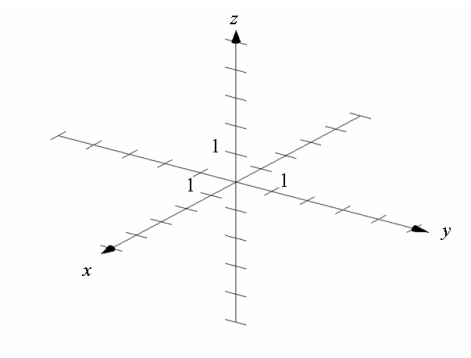


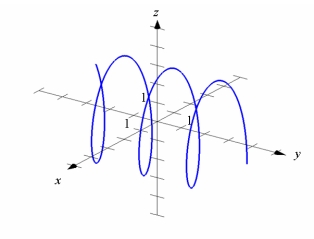
2
Compute the arc length. 
A)
B)
C)
D)

A)

B)

C)

D)

A
3
Find the limit if it exists. 
A)
B)
C)
D) does not exist

A)

B)

C)

D) does not exist
C
4
Sketch, by hand, the curve traced out by the given vector-valued function. 
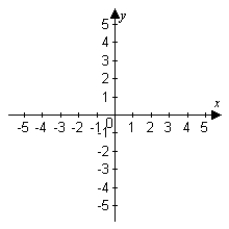



Unlock Deck
Unlock for access to all 103 flashcards in this deck.
Unlock Deck
k this deck
5
Find the limit if it exists. 
A)
B)
C)
D) does not exist

A)

B)

C)

D) does not exist

Unlock Deck
Unlock for access to all 103 flashcards in this deck.
Unlock Deck
k this deck
6
Match the vector-valued function with its graph. 
A)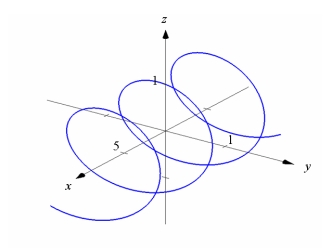
B)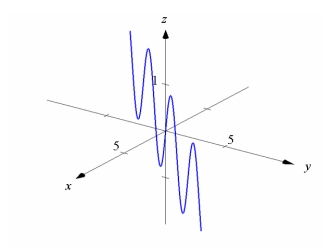
C)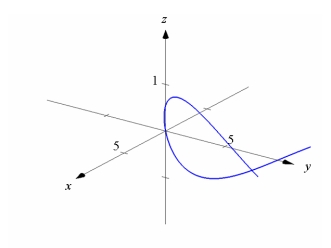
D)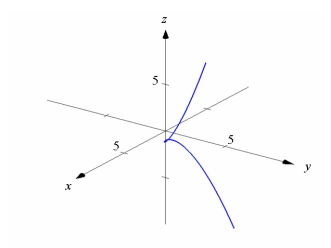

A)

B)

C)

D)


Unlock Deck
Unlock for access to all 103 flashcards in this deck.
Unlock Deck
k this deck
7
Use graphing technology to sketch the curve traced out by the given vector-valued function. 
A)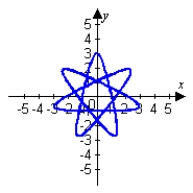
B)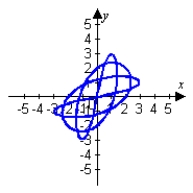
C)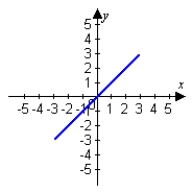
D)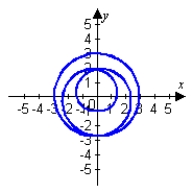

A)

B)

C)

D)


Unlock Deck
Unlock for access to all 103 flashcards in this deck.
Unlock Deck
k this deck
8
Use a CAS to estimate the arc length of the curve. 
A) 16.1
B) 13.6
C) 14.1
D) 18.2

A) 16.1
B) 13.6
C) 14.1
D) 18.2

Unlock Deck
Unlock for access to all 103 flashcards in this deck.
Unlock Deck
k this deck
9
Use a CAS to estimate the arc length of the curve. 
A) 21.4
B) 84.8
C) 33.8
D) 7.6

A) 21.4
B) 84.8
C) 33.8
D) 7.6

Unlock Deck
Unlock for access to all 103 flashcards in this deck.
Unlock Deck
k this deck
10
Use graphing technology to sketch the curve traced out by the given vector-valued function.  Use the viewpoint
Use the viewpoint  and
and  (see figure below).
(see figure below). 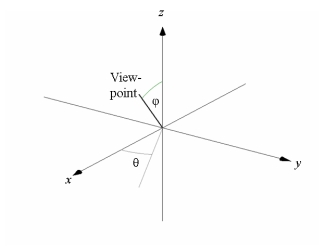
A)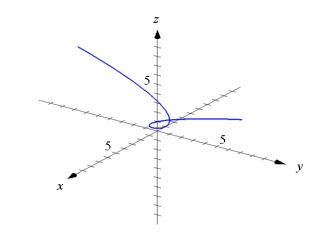
B)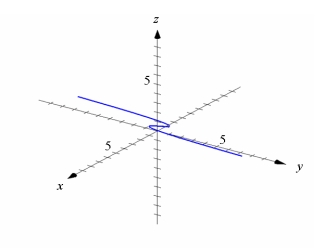
C)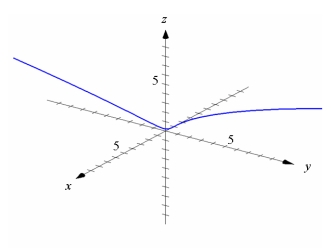
D)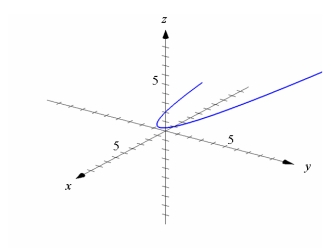
 Use the viewpoint
Use the viewpoint  and
and  (see figure below).
(see figure below). 
A)

B)

C)

D)


Unlock Deck
Unlock for access to all 103 flashcards in this deck.
Unlock Deck
k this deck
11
Determine all values of t at which the given vector-valued function is continuous. 
A)
B)
C)
D) all real numbers

A)

B)

C)

D) all real numbers

Unlock Deck
Unlock for access to all 103 flashcards in this deck.
Unlock Deck
k this deck
12
Find parametric equations for the indicated curve.
The intersection of and z = 2
and z = 2
The intersection of
 and z = 2
and z = 2
Unlock Deck
Unlock for access to all 103 flashcards in this deck.
Unlock Deck
k this deck
13
Sketch, by hand, the curve traced out by the given vector-valued function. 
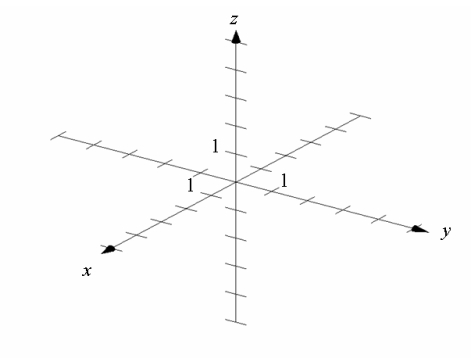



Unlock Deck
Unlock for access to all 103 flashcards in this deck.
Unlock Deck
k this deck
14
Phillip claims that the trajectory  for
for  is identical to the trajectory
is identical to the trajectory  for
for  , where t represents time. Sharon suggests that Phillip's claim is not necessarily true. Who is correct and why?
, where t represents time. Sharon suggests that Phillip's claim is not necessarily true. Who is correct and why?
 for
for  is identical to the trajectory
is identical to the trajectory  for
for  , where t represents time. Sharon suggests that Phillip's claim is not necessarily true. Who is correct and why?
, where t represents time. Sharon suggests that Phillip's claim is not necessarily true. Who is correct and why?
Unlock Deck
Unlock for access to all 103 flashcards in this deck.
Unlock Deck
k this deck
15
Use graphing technology to sketch the curve traced out by the given vector-valued function.  Use the viewpoint
Use the viewpoint  and
and  (see figure below).
(see figure below). 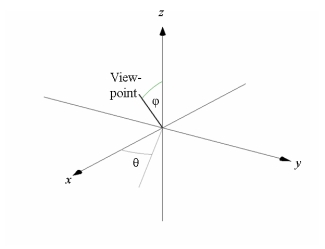
A)
B)
C)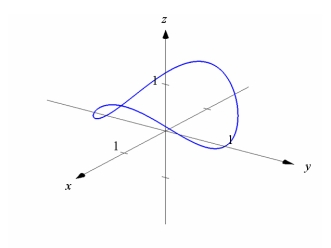
D)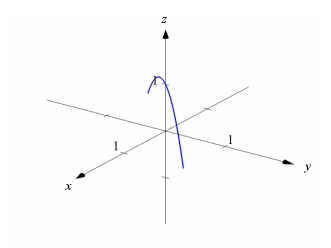
 Use the viewpoint
Use the viewpoint  and
and  (see figure below).
(see figure below). 
A)

B)

C)

D)


Unlock Deck
Unlock for access to all 103 flashcards in this deck.
Unlock Deck
k this deck
16
Show that the curve  lies on the elliptical paraboloid
lies on the elliptical paraboloid  . Show all your work.
. Show all your work.
 lies on the elliptical paraboloid
lies on the elliptical paraboloid  . Show all your work.
. Show all your work.
Unlock Deck
Unlock for access to all 103 flashcards in this deck.
Unlock Deck
k this deck
17
Match the vector-valued function with its graph. 
A)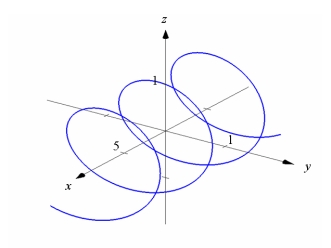
B)
C)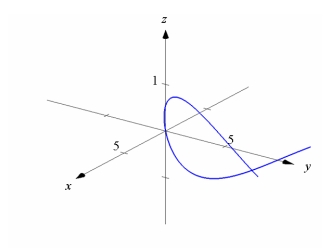
D)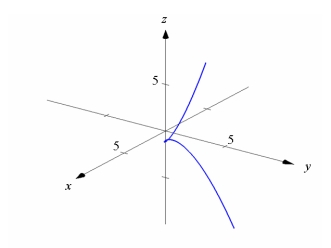

A)

B)

C)

D)


Unlock Deck
Unlock for access to all 103 flashcards in this deck.
Unlock Deck
k this deck
18
Determine all values of t at which the given vector-valued function is continuous. 
A)
B)
C)
D) all real numbers

A)

B)

C)

D) all real numbers

Unlock Deck
Unlock for access to all 103 flashcards in this deck.
Unlock Deck
k this deck
19
Find parametric equations for the indicated curve.
The intersection of and x + y = 2
and x + y = 2
The intersection of
 and x + y = 2
and x + y = 2
Unlock Deck
Unlock for access to all 103 flashcards in this deck.
Unlock Deck
k this deck
20
Match the vector-valued function with its graph. 
A)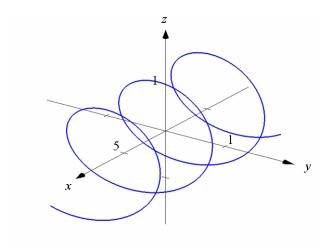
B)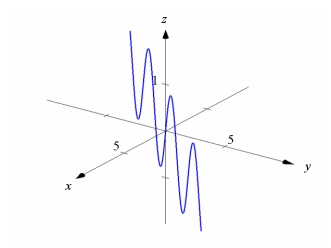
C)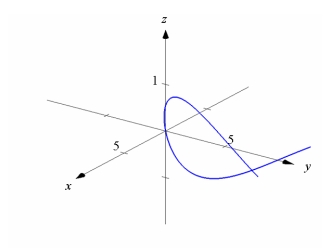
D)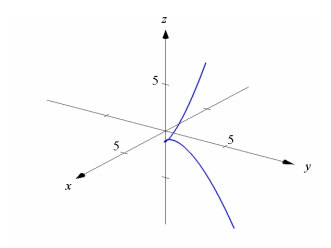

A)

B)

C)

D)


Unlock Deck
Unlock for access to all 103 flashcards in this deck.
Unlock Deck
k this deck
21
Evaluate the given integral. 
A)
B)
C)
D)

A)

B)

C)

D)


Unlock Deck
Unlock for access to all 103 flashcards in this deck.
Unlock Deck
k this deck
22
Find the derivative of the given vector-valued function. 
A)
B)
C)
D)

A)

B)

C)

D)


Unlock Deck
Unlock for access to all 103 flashcards in this deck.
Unlock Deck
k this deck
23
Find t such that  and
and  are perpendicular.
are perpendicular. 
A)
B) t = 0
C)
D) The vectors and
and  are not perpendicular for any value of t.
are not perpendicular for any value of t.
 and
and  are perpendicular.
are perpendicular. 
A)

B) t = 0
C)

D) The vectors
 and
and  are not perpendicular for any value of t.
are not perpendicular for any value of t.
Unlock Deck
Unlock for access to all 103 flashcards in this deck.
Unlock Deck
k this deck
24
Find all values of t such that  is parallel to the xy-plane.
is parallel to the xy-plane. 
A)
B)
C)
D)
 is parallel to the xy-plane.
is parallel to the xy-plane. 
A)

B)

C)

D)


Unlock Deck
Unlock for access to all 103 flashcards in this deck.
Unlock Deck
k this deck
25
Evaluate the given integral. 
A)
B)
C)
D)

A)

B)

C)

D)


Unlock Deck
Unlock for access to all 103 flashcards in this deck.
Unlock Deck
k this deck
26
Find t such that  and
and  are perpendicular.
are perpendicular. 
A) , k an integer
, k an integer
B) t = 0
C)
D) The vectors and
and  are not perpendicular for any value of t.
are not perpendicular for any value of t.
 and
and  are perpendicular.
are perpendicular. 
A)
 , k an integer
, k an integerB) t = 0
C)

D) The vectors
 and
and  are not perpendicular for any value of t.
are not perpendicular for any value of t.
Unlock Deck
Unlock for access to all 103 flashcards in this deck.
Unlock Deck
k this deck
27
Find the position function from the given velocity function. 
A)
B)
C)
D)

A)

B)

C)

D)


Unlock Deck
Unlock for access to all 103 flashcards in this deck.
Unlock Deck
k this deck
28
Find all values of t such that  is parallel to the xy-plane.
is parallel to the xy-plane. 
A)
B)
C)
D) is not parallel to the xy-plane for any real value of t
is not parallel to the xy-plane for any real value of t
 is parallel to the xy-plane.
is parallel to the xy-plane. 
A)

B)

C)

D)
 is not parallel to the xy-plane for any real value of t
is not parallel to the xy-plane for any real value of t
Unlock Deck
Unlock for access to all 103 flashcards in this deck.
Unlock Deck
k this deck
29
Find the acceleration function for the given position function. 
A)
B)
C)
D)

A)

B)

C)

D)


Unlock Deck
Unlock for access to all 103 flashcards in this deck.
Unlock Deck
k this deck
30
Find the derivative of the given vector-valued function. 
A)
B)
C)
D)

A)

B)

C)

D)


Unlock Deck
Unlock for access to all 103 flashcards in this deck.
Unlock Deck
k this deck
31
Evaluate the given integral. 
A)
B)
C)
D)

A)

B)

C)

D)


Unlock Deck
Unlock for access to all 103 flashcards in this deck.
Unlock Deck
k this deck
32
Show that there are no values of t such that  and
and  are parallel. Show your work.
are parallel. Show your work. 
 and
and  are parallel. Show your work.
are parallel. Show your work. 

Unlock Deck
Unlock for access to all 103 flashcards in this deck.
Unlock Deck
k this deck
33
Find the velocity function for the given position function. 
A)
B)
C)
D)

A)

B)

C)

D)


Unlock Deck
Unlock for access to all 103 flashcards in this deck.
Unlock Deck
k this deck
34
Find the acceleration function for the given position function. 
A)
B)
C)
D)

A)

B)

C)

D)


Unlock Deck
Unlock for access to all 103 flashcards in this deck.
Unlock Deck
k this deck
35
Evaluate the given integral. 
A)
B)
C)
D)

A)

B)

C)

D)


Unlock Deck
Unlock for access to all 103 flashcards in this deck.
Unlock Deck
k this deck
36
Label as true or false. Explain your answer or give a counterexample. [Hint - it may be useful to think about circular motion about the origin.] ![Label as true or false. Explain your answer or give a counterexample. [Hint - it may be useful to think about circular motion about the origin.]](https://d2lvgg3v3hfg70.cloudfront.net/TB2342/11eaa948_cda7_6301_84bc_799e0aee55bf_TB2342_11.jpg)
![Label as true or false. Explain your answer or give a counterexample. [Hint - it may be useful to think about circular motion about the origin.]](https://d2lvgg3v3hfg70.cloudfront.net/TB2342/11eaa948_cda7_6301_84bc_799e0aee55bf_TB2342_11.jpg)

Unlock Deck
Unlock for access to all 103 flashcards in this deck.
Unlock Deck
k this deck
37
Find t such that  and
and  are perpendicular.
are perpendicular. 
A)
B) t = 0
C)
D) The vectors and
and  are not perpendicular for any value of t.
are not perpendicular for any value of t.
 and
and  are perpendicular.
are perpendicular. 
A)

B) t = 0
C)

D) The vectors
 and
and  are not perpendicular for any value of t.
are not perpendicular for any value of t.
Unlock Deck
Unlock for access to all 103 flashcards in this deck.
Unlock Deck
k this deck
38
Find the position function from the given velocity function. 
A)
B)
C)
D)

A)

B)

C)

D)


Unlock Deck
Unlock for access to all 103 flashcards in this deck.
Unlock Deck
k this deck
39
Determine whether the following is true or false. 


Unlock Deck
Unlock for access to all 103 flashcards in this deck.
Unlock Deck
k this deck
40
Find the velocity function for the given position function. 
A)
B)
C)
D)

A)

B)

C)

D)


Unlock Deck
Unlock for access to all 103 flashcards in this deck.
Unlock Deck
k this deck
41
Find the force acting on an object of mass 12 kg with the given position function (in meters and seconds). 
A)
B)
C)
D)

A)

B)

C)

D)


Unlock Deck
Unlock for access to all 103 flashcards in this deck.
Unlock Deck
k this deck
42
Find the landing point for a projectile launched under the given conditions. Round distances to the nearest foot. Assign your coordinate system as indicated in the figure below. 
A)
B)
C)
D)

A)

B)

C)

D)


Unlock Deck
Unlock for access to all 103 flashcards in this deck.
Unlock Deck
k this deck
43
A stationary merry-go-round of radius 6 feet is started in motion by a push consisting of a force of 15 pounds on the outside edge, tangent to the circular edge of the merry-go-round, for 2 seconds. The moment of inertia of the merry-go-round is  . Find the resulting angular velocity of the merry-go-around.
. Find the resulting angular velocity of the merry-go-around.
A) 5 rad/sec
B) 10 rad/sec
C) 4 rad/sec
D) 9 rad/sec
 . Find the resulting angular velocity of the merry-go-around.
. Find the resulting angular velocity of the merry-go-around.A) 5 rad/sec
B) 10 rad/sec
C) 4 rad/sec
D) 9 rad/sec

Unlock Deck
Unlock for access to all 103 flashcards in this deck.
Unlock Deck
k this deck
44
Find the force acting on an object of mass 23 kg with the given position function (in meters and seconds). 
A)
B)
C)
D)

A)

B)

C)

D)


Unlock Deck
Unlock for access to all 103 flashcards in this deck.
Unlock Deck
k this deck
45
Find the unit tangent vector to the curve at the indicated point. 
A)
B)
C)
D)

A)

B)

C)

D)


Unlock Deck
Unlock for access to all 103 flashcards in this deck.
Unlock Deck
k this deck
46
Ted tells his incredulous nephews that he can turn a bucket of water upside down without the water pouring out! To illustrate, he puts a small amount of water in a bucket and swings it around in a circle so that the bucket travels from his knees, up over his head, and swings back down to his knees (see figure). If the water is 2.2 feet from the center of the circle of motion and is weightless at the top of the loop, what is the linear speed of the bucket? [Ignore the fact that the water in the bucket has depth; that is, pretend all the water is 2.2 feet from the loop's center.] ![<strong>Ted tells his incredulous nephews that he can turn a bucket of water upside down without the water pouring out! To illustrate, he puts a small amount of water in a bucket and swings it around in a circle so that the bucket travels from his knees, up over his head, and swings back down to his knees (see figure). If the water is 2.2 feet from the center of the circle of motion and is weightless at the top of the loop, what is the linear speed of the bucket? [Ignore the fact that the water in the bucket has depth; that is, pretend all the water is 2.2 feet from the loop's center.] </strong> A) 8.4 ft/s B) 3.8 ft/s C) 4.2 ft/s D) 16.8 ft/s](https://d2lvgg3v3hfg70.cloudfront.net/TB2342/11eaa948_cdaa_bec2_84bc_1b7d08b70360_TB2342_00.jpg)
A) 8.4 ft/s
B) 3.8 ft/s
C) 4.2 ft/s
D) 16.8 ft/s
![<strong>Ted tells his incredulous nephews that he can turn a bucket of water upside down without the water pouring out! To illustrate, he puts a small amount of water in a bucket and swings it around in a circle so that the bucket travels from his knees, up over his head, and swings back down to his knees (see figure). If the water is 2.2 feet from the center of the circle of motion and is weightless at the top of the loop, what is the linear speed of the bucket? [Ignore the fact that the water in the bucket has depth; that is, pretend all the water is 2.2 feet from the loop's center.] </strong> A) 8.4 ft/s B) 3.8 ft/s C) 4.2 ft/s D) 16.8 ft/s](https://d2lvgg3v3hfg70.cloudfront.net/TB2342/11eaa948_cdaa_bec2_84bc_1b7d08b70360_TB2342_00.jpg)
A) 8.4 ft/s
B) 3.8 ft/s
C) 4.2 ft/s
D) 16.8 ft/s

Unlock Deck
Unlock for access to all 103 flashcards in this deck.
Unlock Deck
k this deck
47
At Erik's sixth-year birthday party, the children are playing a game where each contestant tries to throw a tennis ball into a cardboard box located 16 feet away. The box is 18 inches tall and 24 inches wide (see figure). A child tosses a ball with an initial height of 16 inches and an angle of 45o from the horizontal. If the initial speed of the ball is 30 feet per second, will the ball land in the box? Show all of your work. [Ignore the radius of the ball. Assume that the only force acting on the ball is gravity.Assume that the ball is "on-target" and that there is nothing behind the box to cause a rebound. Note that g = 32 ft/s2 = 384 in/s2.] ![At Erik's sixth-year birthday party, the children are playing a game where each contestant tries to throw a tennis ball into a cardboard box located 16 feet away. The box is 18 inches tall and 24 inches wide (see figure). A child tosses a ball with an initial height of 16 inches and an angle of 45<sup>o</sup> from the horizontal. If the initial speed of the ball is 30 feet per second, will the ball land in the box? Show all of your work. [Ignore the radius of the ball. Assume that the only force acting on the ball is gravity.Assume that the ball is on-target and that there is nothing behind the box to cause a rebound. Note that g = 32 ft/s<sup>2</sup> = 384 in/s<sup>2</sup>.] [The figure not necessarily drawn to scale.]](https://d2lvgg3v3hfg70.cloudfront.net/TB2342/11eaa948_cdaa_e5d3_84bc_992409c5b5a8_TB2342_00.jpg) [The figure not necessarily drawn to scale.]
[The figure not necessarily drawn to scale.]
![At Erik's sixth-year birthday party, the children are playing a game where each contestant tries to throw a tennis ball into a cardboard box located 16 feet away. The box is 18 inches tall and 24 inches wide (see figure). A child tosses a ball with an initial height of 16 inches and an angle of 45<sup>o</sup> from the horizontal. If the initial speed of the ball is 30 feet per second, will the ball land in the box? Show all of your work. [Ignore the radius of the ball. Assume that the only force acting on the ball is gravity.Assume that the ball is on-target and that there is nothing behind the box to cause a rebound. Note that g = 32 ft/s<sup>2</sup> = 384 in/s<sup>2</sup>.] [The figure not necessarily drawn to scale.]](https://d2lvgg3v3hfg70.cloudfront.net/TB2342/11eaa948_cdaa_e5d3_84bc_992409c5b5a8_TB2342_00.jpg) [The figure not necessarily drawn to scale.]
[The figure not necessarily drawn to scale.]
Unlock Deck
Unlock for access to all 103 flashcards in this deck.
Unlock Deck
k this deck
48
A projectile is fired with initial speed  feet per second from a height of h feet at an angle of
feet per second from a height of h feet at an angle of  above the horizontal. Assuming that the only force acting on the object is gravity, find the maximum altitude. Round to the nearest tenth of a foot.
above the horizontal. Assuming that the only force acting on the object is gravity, find the maximum altitude. Round to the nearest tenth of a foot. 
A) 187.7 ft
B) 530.9 ft
C) 155.0 ft
D) 750.8 ft
 feet per second from a height of h feet at an angle of
feet per second from a height of h feet at an angle of  above the horizontal. Assuming that the only force acting on the object is gravity, find the maximum altitude. Round to the nearest tenth of a foot.
above the horizontal. Assuming that the only force acting on the object is gravity, find the maximum altitude. Round to the nearest tenth of a foot. 
A) 187.7 ft
B) 530.9 ft
C) 155.0 ft
D) 750.8 ft

Unlock Deck
Unlock for access to all 103 flashcards in this deck.
Unlock Deck
k this deck
49
Which of the following is an arc length parameterization of the given two-dimensional curve? The line segment from  to
to 
A)
B)
C)
D)
 to
to 
A)

B)

C)

D)


Unlock Deck
Unlock for access to all 103 flashcards in this deck.
Unlock Deck
k this deck
50
Find the position function from the given acceleration function. 
A)
B)
C)
D)

A)

B)

C)

D)


Unlock Deck
Unlock for access to all 103 flashcards in this deck.
Unlock Deck
k this deck
51
Find the curvature at the given point. 
A)
B)
C)
D)

A)

B)

C)

D)


Unlock Deck
Unlock for access to all 103 flashcards in this deck.
Unlock Deck
k this deck
52
Find the magnitude of the net force on an object of mass 13 kg with the given position function (in units of meters and seconds). 
A) 5070 Newtons
B) 3900 Newtons
C) 390 Newtons
D) 1170 Newtons

A) 5070 Newtons
B) 3900 Newtons
C) 390 Newtons
D) 1170 Newtons

Unlock Deck
Unlock for access to all 103 flashcards in this deck.
Unlock Deck
k this deck
53
A projectile is fired with initial speed  feet per second from a height of h feet at an angle of
feet per second from a height of h feet at an angle of  above the horizontal. Assuming that the only force acting on the object is gravity, find the speed at impact. Round to the nearest tenth of a foot.
above the horizontal. Assuming that the only force acting on the object is gravity, find the speed at impact. Round to the nearest tenth of a foot. 
A) 263.1 ft/s
B) 725.9 ft/s
C) 181.8 ft/s
D) 1022.4 ft/s
 feet per second from a height of h feet at an angle of
feet per second from a height of h feet at an angle of  above the horizontal. Assuming that the only force acting on the object is gravity, find the speed at impact. Round to the nearest tenth of a foot.
above the horizontal. Assuming that the only force acting on the object is gravity, find the speed at impact. Round to the nearest tenth of a foot. 
A) 263.1 ft/s
B) 725.9 ft/s
C) 181.8 ft/s
D) 1022.4 ft/s

Unlock Deck
Unlock for access to all 103 flashcards in this deck.
Unlock Deck
k this deck
54
Find the centripetal force on an object of mass 14 kg with the given position function (in units of meters and seconds). 
A)
B)
C)
D)

A)

B)

C)

D)


Unlock Deck
Unlock for access to all 103 flashcards in this deck.
Unlock Deck
k this deck
55
Find the unit tangent vector to the curve at the indicated point. 
A)
B)
C)
D)

A)

B)

C)

D)


Unlock Deck
Unlock for access to all 103 flashcards in this deck.
Unlock Deck
k this deck
56
A golfer rotates a club with constant angular acceleration  through an angle of
through an angle of  radians. If the angular velocity increases from 0 to 10 rad/sec, find
radians. If the angular velocity increases from 0 to 10 rad/sec, find  .
.
A) rad/sec2
rad/sec2
B) rad/sec2
rad/sec2
C) rad/sec2
rad/sec2
D) rad/sec2
rad/sec2
 through an angle of
through an angle of  radians. If the angular velocity increases from 0 to 10 rad/sec, find
radians. If the angular velocity increases from 0 to 10 rad/sec, find  .
.A)
 rad/sec2
rad/sec2B)
 rad/sec2
rad/sec2C)
 rad/sec2
rad/sec2D)
 rad/sec2
rad/sec2
Unlock Deck
Unlock for access to all 103 flashcards in this deck.
Unlock Deck
k this deck
57
Find the position function from the given acceleration function. 
A)
B)
C)
D)

A)

B)

C)

D)


Unlock Deck
Unlock for access to all 103 flashcards in this deck.
Unlock Deck
k this deck
58
A projectile is fired with initial speed  feet per second from a height of h feet at an angle of
feet per second from a height of h feet at an angle of  above the horizontal. Assuming that the only force acting on the object is gravity, find the horizontal range. Round to the nearest tenth of a foot.
above the horizontal. Assuming that the only force acting on the object is gravity, find the horizontal range. Round to the nearest tenth of a foot. 
A) 216.6 ft
B) 836.6 ft
C) 231.4 ft
D) 1448.8 ft
 feet per second from a height of h feet at an angle of
feet per second from a height of h feet at an angle of  above the horizontal. Assuming that the only force acting on the object is gravity, find the horizontal range. Round to the nearest tenth of a foot.
above the horizontal. Assuming that the only force acting on the object is gravity, find the horizontal range. Round to the nearest tenth of a foot. 
A) 216.6 ft
B) 836.6 ft
C) 231.4 ft
D) 1448.8 ft

Unlock Deck
Unlock for access to all 103 flashcards in this deck.
Unlock Deck
k this deck
59
Which of the following is an arc length parameterization of the given two-dimensional curve? The circle of radius 4 centered at the origin
A)
B)
C)
D)
A)

B)

C)

D)


Unlock Deck
Unlock for access to all 103 flashcards in this deck.
Unlock Deck
k this deck
60
On the highly-successful TV game show Wheel of Fortune, a contestant spins a large spinner wheel that determines the amount of money for which the contestant is playing. Typically, contestants spin the wheel at an initial rate of 3.3 rad/s, and the (constant) frictional force stops the wheel in about 2.7 seconds. If the frictional force produces a torque of 19.1 foot-pounds, estimate the moment of inertia of the wheel.
A) 15.6
B) 4.0
C) 0.0640
D) 7.2
A) 15.6
B) 4.0
C) 0.0640
D) 7.2

Unlock Deck
Unlock for access to all 103 flashcards in this deck.
Unlock Deck
k this deck
61
Use the graph of  below to predict whether the curvature would be larger at
below to predict whether the curvature would be larger at  or
or  .
. 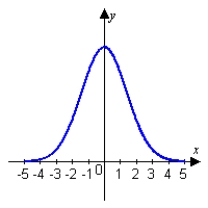
A)
B)
C)
 below to predict whether the curvature would be larger at
below to predict whether the curvature would be larger at  or
or  .
. 
A)

B)

C)


Unlock Deck
Unlock for access to all 103 flashcards in this deck.
Unlock Deck
k this deck
62
Consider the claim that there exists a curve ![Consider the claim that there exists a curve for which . Do you agree with this claim? Explain or justify your answer. [You need not give a rigorous proof.]](https://d2lvgg3v3hfg70.cloudfront.net/TB2342/11eaa948_cdaf_2b13_84bc_dff466ea8247_TB2342_11.jpg) for which
for which ![Consider the claim that there exists a curve for which . Do you agree with this claim? Explain or justify your answer. [You need not give a rigorous proof.]](https://d2lvgg3v3hfg70.cloudfront.net/TB2342/11eaa948_cdaf_2b14_84bc_a7e4d02a0414_TB2342_11.jpg) . Do you agree with this claim? Explain or justify your answer. [You need not give a rigorous proof.]
. Do you agree with this claim? Explain or justify your answer. [You need not give a rigorous proof.]
![Consider the claim that there exists a curve for which . Do you agree with this claim? Explain or justify your answer. [You need not give a rigorous proof.]](https://d2lvgg3v3hfg70.cloudfront.net/TB2342/11eaa948_cdaf_2b13_84bc_dff466ea8247_TB2342_11.jpg) for which
for which ![Consider the claim that there exists a curve for which . Do you agree with this claim? Explain or justify your answer. [You need not give a rigorous proof.]](https://d2lvgg3v3hfg70.cloudfront.net/TB2342/11eaa948_cdaf_2b14_84bc_a7e4d02a0414_TB2342_11.jpg) . Do you agree with this claim? Explain or justify your answer. [You need not give a rigorous proof.]
. Do you agree with this claim? Explain or justify your answer. [You need not give a rigorous proof.]
Unlock Deck
Unlock for access to all 103 flashcards in this deck.
Unlock Deck
k this deck
63
Use the graph of  below to predict whether the curvature would be larger at
below to predict whether the curvature would be larger at  or
or  .
. 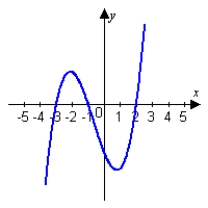
A)
B)
C)
 below to predict whether the curvature would be larger at
below to predict whether the curvature would be larger at  or
or  .
. 
A)

B)

C)


Unlock Deck
Unlock for access to all 103 flashcards in this deck.
Unlock Deck
k this deck
64
Find the unit normal vector at the given point. 
A)
B)
C)
D)

A)

B)

C)

D)


Unlock Deck
Unlock for access to all 103 flashcards in this deck.
Unlock Deck
k this deck
65
Find the tangential and normal components of acceleration for the given position function at the indicated point. 
A)
B)
C)
D)

A)

B)

C)

D)


Unlock Deck
Unlock for access to all 103 flashcards in this deck.
Unlock Deck
k this deck
66
Sketch a plausible curve with domain  that has the curvature function graphed below.
that has the curvature function graphed below. 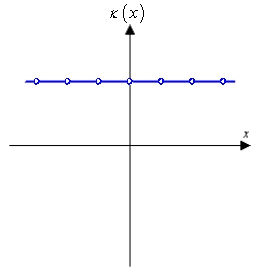
 that has the curvature function graphed below.
that has the curvature function graphed below. 

Unlock Deck
Unlock for access to all 103 flashcards in this deck.
Unlock Deck
k this deck
67
Find the curvature of the polar curve at the indicated point. 
A)
B)
C)
D)

A)

B)

C)

D)


Unlock Deck
Unlock for access to all 103 flashcards in this deck.
Unlock Deck
k this deck
68
Find the curvature at the given point. 
A)
B)
C)
D)

A)

B)

C)

D)


Unlock Deck
Unlock for access to all 103 flashcards in this deck.
Unlock Deck
k this deck
69
Graph the curvature function  for
for  and find the limit of the curvature as
and find the limit of the curvature as  .
. 
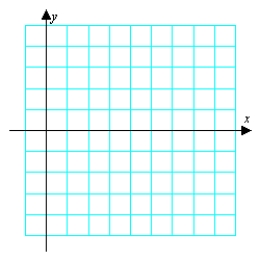
A)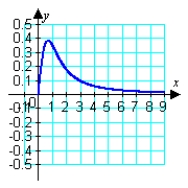

B)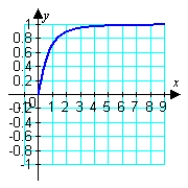

C)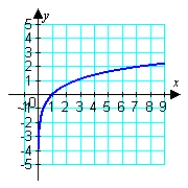

D)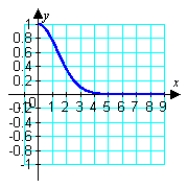

 for
for  and find the limit of the curvature as
and find the limit of the curvature as  .
. 

A)


B)


C)


D)



Unlock Deck
Unlock for access to all 103 flashcards in this deck.
Unlock Deck
k this deck
70
Use the graph of  below to predict whether the curvature would be larger at
below to predict whether the curvature would be larger at  or
or  .
. 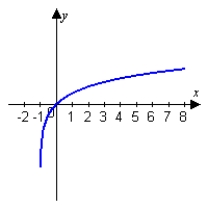
A)
B)
C)
 below to predict whether the curvature would be larger at
below to predict whether the curvature would be larger at  or
or  .
. 
A)

B)

C)


Unlock Deck
Unlock for access to all 103 flashcards in this deck.
Unlock Deck
k this deck
71
Graph the curvature function  for
for  and find the limit of the curvature as
and find the limit of the curvature as  .
. 
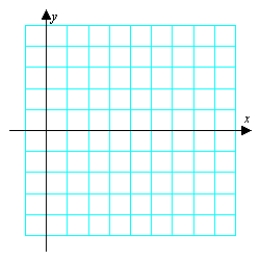
A)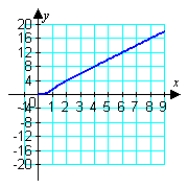

B)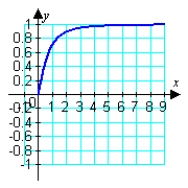

C)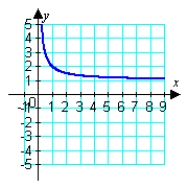

D)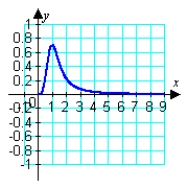

 for
for  and find the limit of the curvature as
and find the limit of the curvature as  .
. 

A)


B)


C)


D)



Unlock Deck
Unlock for access to all 103 flashcards in this deck.
Unlock Deck
k this deck
72
Find the unit normal vector at the given point. 
A)
B)
C)
D)

A)

B)

C)

D)


Unlock Deck
Unlock for access to all 103 flashcards in this deck.
Unlock Deck
k this deck
73
Find the curvature of the polar curve at the indicated point. 
A)
B)
C)
D) undefined

A)

B)

C)

D) undefined

Unlock Deck
Unlock for access to all 103 flashcards in this deck.
Unlock Deck
k this deck
74
Sketch the curve and find any points of maximum or minimum curvature. 
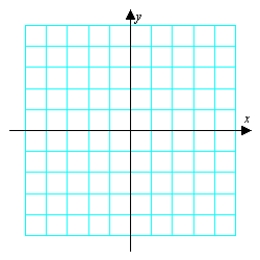
A) maximum curvature: and
and  ; minimum curvature:
; minimum curvature: 
B) no maximum curvature; minimum curvature: and
and 
C) maximum curvature: and
and  ; minimum curvature:
; minimum curvature: 
D) maximum curvature: and
and  ; no minimum curvature
; no minimum curvature


A) maximum curvature:
 and
and  ; minimum curvature:
; minimum curvature: 
B) no maximum curvature; minimum curvature:
 and
and 
C) maximum curvature:
 and
and  ; minimum curvature:
; minimum curvature: 
D) maximum curvature:
 and
and  ; no minimum curvature
; no minimum curvature
Unlock Deck
Unlock for access to all 103 flashcards in this deck.
Unlock Deck
k this deck
75
Find the unit normal vector at the given point. 
A)
B)
C)
D)

A)

B)

C)

D)


Unlock Deck
Unlock for access to all 103 flashcards in this deck.
Unlock Deck
k this deck
76
Find the osculating circle at the given point. 
A)
B)
C)
D)

A)

B)

C)

D)


Unlock Deck
Unlock for access to all 103 flashcards in this deck.
Unlock Deck
k this deck
77
Find the osculating circle at the given point. 
A)
B)
C)
D) There is no osculating circle at the given point.

A)

B)

C)

D) There is no osculating circle at the given point.

Unlock Deck
Unlock for access to all 103 flashcards in this deck.
Unlock Deck
k this deck
78
Sketch the curve and find any points of maximum or minimum curvature. 
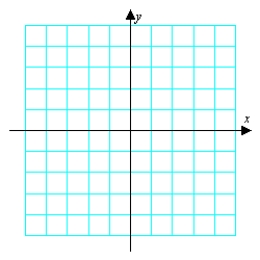
A) maximum curvature: ; minimum curvature:
; minimum curvature: 
B) maximum curvature: ; minimum curvature:
; minimum curvature: 
C) maximum curvature: and
and  ; no minimum curvature
; no minimum curvature
D) maximum curvature: ; no minimum curvature
; no minimum curvature


A) maximum curvature:
 ; minimum curvature:
; minimum curvature: 
B) maximum curvature:
 ; minimum curvature:
; minimum curvature: 
C) maximum curvature:
 and
and  ; no minimum curvature
; no minimum curvatureD) maximum curvature:
 ; no minimum curvature
; no minimum curvature
Unlock Deck
Unlock for access to all 103 flashcards in this deck.
Unlock Deck
k this deck
79
Graph the curvature function  for
for  and find the limit of the curvature as
and find the limit of the curvature as  .
. 
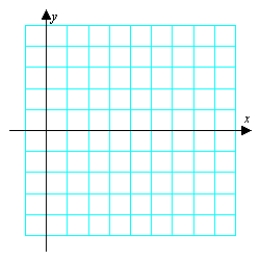
A)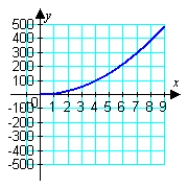

B)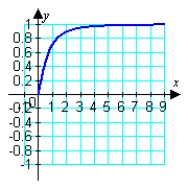

C)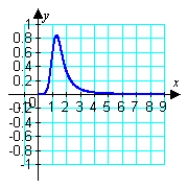

D)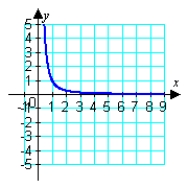

 for
for  and find the limit of the curvature as
and find the limit of the curvature as  .
. 

A)


B)


C)


D)



Unlock Deck
Unlock for access to all 103 flashcards in this deck.
Unlock Deck
k this deck
80
For the circle with radius c centered at  , show that the curvature at any point is equal to
, show that the curvature at any point is equal to  . Show all of your work.
. Show all of your work.
 , show that the curvature at any point is equal to
, show that the curvature at any point is equal to  . Show all of your work.
. Show all of your work.
Unlock Deck
Unlock for access to all 103 flashcards in this deck.
Unlock Deck
k this deck



